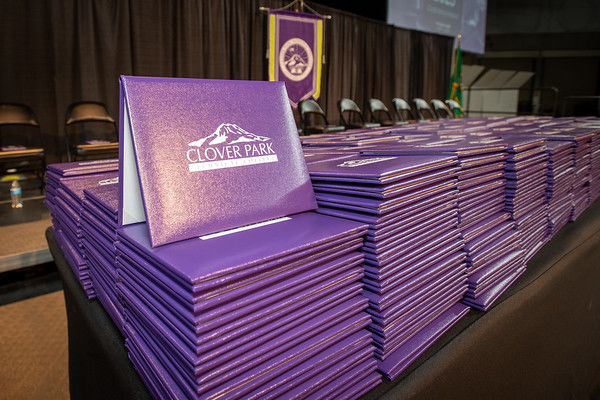High School+ offers customized pathway to diploma
By Jean Borst

Growing up in Mississippi, Robert Waits struggled with literacy. His teachers told him he would never have the education he wanted.
Having “graduating” through the now defunct No Child Left Behind program, Waits still couldn’t read or write and didn’t have a high school diploma. He wanted better. After moving to Tacoma, he sought out literacy tutors through the Adults With Learning Disabilities (AWLD) Foundation and found his way to the High School+ program through Clover Park Technical College (CPTC). Working one-on-one with an instructor to complete an individualized program that suited his learning needs, Waits earned his high school diploma through CPTC in 2022. He went on to realize his dream of getting his CDL Class A license and now has a stable job as a truck driver.
Credits for life
High School+ is a competency-based program for adult learners 18 and older who do not have a high school diploma or equivalency. Students can complete their Washington state high school diploma through a combination of previously earned credits from high school or college, life and work experience, and individual coursework at CPTC.
For example, students can earn high school credits for being a parent or speaking another language. Some have received credit for their experience as tribal leaders.
The process begins with an initial meeting to determine what prior credits can be applied to fulfill graduation requirements and what classes need to be completed. Taking work schedules and family obligations into consideration, an instructor creates a customized education plan and meets weekly with students to check in on their progress.
Because each student has a different experience, class requirements and the time frame to complete the program vary. It typically takes anywhere from three to nine months for students to complete the High School+ program, which can include in-person classes on campus and at off-site locations, as well as online instruction.
Eliminating barriers
High School+ challenges traditional pathways to graduation, particularly for those who don’t learn in traditional ways. “This isn’t about seat time,” said Felicia Dennis, CPTC Transitional Studies Navigator. “High School+ honors each student’s values, world experiences and learning abilities. It also offers culturally responsible curriculum and assessment methods.”
Dennis has seen great success with the program, particularly among adults with test anxiety and other learning challenges standing between them and their high school diploma or equivalency. “This is not a pass or fail program,” she said. “Students earn credits as they learn.”
In addition to reducing learning barriers, the program also eliminates financial hurdles. The cost for High School+ is $25 per quarter, which is waived if students are unable to afford it. Proof of need is not required.
Word is spreading
CPTC began offering High School+ just before the pandemic. After an initial slow start, the program has picked up steam. Today, High School+ is one of the college’s fastest expanding programs. In 2022-23 alone, the program graduated 43 students over 2 quarters, and anticipates over 100 graduates for the year. Nearly 72 percent of graduates were students of color.
As High School+ students share their experience with family and friends, word-of-mouth is a big reason for the program’s fast growth. High School+ has also expanded thanks to community partnerships that offer convenient off-campus locations within the WorkSource Pierce network, including the Goodwill Milgard Work Opportunity Center, Pierce County Court Resource Center, Centro Rendu of St. Vincent de Paul and Mi Centro. The program recently extended its reach to offer Pierce County’s only bilingual High School+/GED option. Classes are held offsite at Centro Rendu.
High School+ is one of two options offered by CPTC for adult students seeing their high school diploma. The college also offers GED classes that help students prepare for and take any of the required GED tests.
For more information and to get started on your path to a high school diploma, visit the Transitional Studies page on the CPTC website.